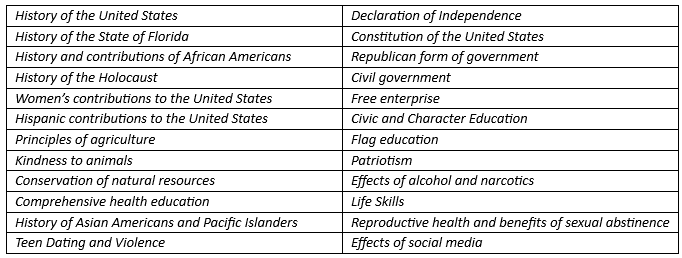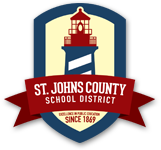St. Johns County School District Vision
All students will choose a learning path that leads to a well-rounded graduate who demonstrates good character and leadership.
St. Johns County School District Mission
The St. Johns County School District will inspire good character and a passion for lifelong learning in all students, creating educated and caring contributors to the world.
Purpose of the plan
The St. Johns County School District Student Progression Plan is in accordance with Florida Statute 1008.25. The purpose of this plan is to delineate that each student’s progression from one grade to another be determined, in part, upon satisfactory performance in English Language Arts, social studies, science, and mathematics; alignment of district school board policies that facilitate student achievement; that each student and his or her parent be informed of the student’s academic progress; that students have access to educational options that provide academically challenging coursework or accelerated instruction pursuant to Florida Statute 1002.3105.
To ensure that the district is meeting the needs of students, and responding to legislation, the St. Johns County School Board has established a comprehensive program to ensure student progression which includes the following:
- Standards for evaluating each student’s performance, including how well he/she masters the performance standards approved by the State Board of Education.
- Specific levels of performance in reading, writing, science, mathematics, and social studies for each grade level, including the levels of performance on statewide assessments.
- Appropriate alternative placement for a student who has been retained two or more years.
- Procedures for informing each student and his or her parents/legal guardians of the student’s academic progress.
All procedures listed in the Student Progression Plan are subject to change due to School Board or legislative action. This plan is updated yearly and available to the public on the district website.
Students will be placed in programs and levels best suited to meet their academic needs and customized learning path, with consideration given to their social, emotional, and physical development.
Decisions about student promotion, retention and special placement are mainly the responsibility of the school’s professional staff. District and state regulations place the responsibility for decisions regarding student placement with the principal and the Multi-Tiered System of Support team or its equivalent.
It is the responsibility of the School Board and district administration to provide students with effective instructional and support programs that accomplish the following:
- Monitor student progress.
- Promote continuous achievement.
- Make provisions for individual differences.
- Promote students’ assuming responsibility for their own learning and attendance.
- Provide effective, engaging instruction and support.
- Document instruction in, and student mastery of, the standards.
*A student scoring below grade level must receive instructional support or be retained in an intensive program that is different from the previous year’s program and addresses the student’s learning needs.
Mandatory School Attendance
Florida Statute 1003.21 specifies all children who will have attained the age of 5 years on or before September 1 of the school year are eligible for admission to kindergarten during that school year. All students who have attained the age of 6 years or who will have attained the age of 6 years by February 1 of any school year or who are older than 6 years of age but who have not attained the age of 16 years, except as otherwise provided, are required to attend school regularly during the entire school term. For specific information about attendance, please see the Student Code of Conduct on the district website: https://www.stjohns.k12.fl.us/schoolservices/conduct/.
Parent/legal guardian and student responsibilities are:
- To be informed of school board policies and school rules about absenteeism and tardiness.
- To appeal a decision about an absence.
- To make up class work in a reasonable amount of time after an excused absence.
- To attend classes daily and be on time.
- To explain or document the reason for an absence.
- To request make-up work after an absence and to complete it in a reasonable amount of time.
K-12 students and their parents/legal guardians are afforded numerous statutory rights including absence for religious purposes. A parent/legal guardian of a public-school student may request and be granted permission for absence of the student from school for religious instruction or religious holidays or absence for treatment of autism spectrum disorder.
For specific information about attendance, please see the Student Code of Conduct on the District website at http://www.stjohns.k12.fl.us/schoolservices/conduct/.
Required Instructional Time
Florida Statute 1011.61 (a)(1) defines a full-time student in grades 4 through 12, as one who participates in no less than 900 hours of instruction in a standard school. Further, students in kindergarten through grade 3 must participate in no less than 720 hours of instruction in a standard school.
State Required Instruction
Florida Statute 1003.42 requires members of the instructional staff to employ approved methods of instruction and to embed required instructional components, where age appropriate. The following is not an exhaustive list.

Comprehensive health education addresses concepts of community health; consumer health; environmental health; family life, including an awareness of the benefits of sexual abstinence as the expected standard and the consequences of teenage pregnancy; mental and emotional health; injury prevention and safety; Internet safety; nutrition; personal health; prevention and control of disease; and substance use and abuse. State board rule further specifies that comprehensive health education must annually include:
- five hours of instruction related to youth mental health awareness and assistance, including suicide prevention and the impacts of substance abuse for students in grades 6-12 (Rule 6A1.094121, F.A.C.),
- instruction related to youth substance use and abuse health education in grades K-12 (Rule 6A1.094122, F.A.C.); and
- instruction related to child trafficking prevention and awareness in grades K-12 (Rule 6A1.094123, F.A.C.).
Students may be exempted from the comprehensive health components that include reproductive health or the symptoms, development, and treatment of any disease, including HIV and AIDS, when requested by a parent in writing. A student who is exempted will not be penalized because of the exemption.
Parental Rights
The state, its political subdivisions, any other governmental entity, or other institution may not infringe upon the fundamental rights of a parent to direct the upbringing, education, health care, and mental health of a minor child. If those entities infringe upon a parent’s fundamental right, they must demonstrate that the action is reasonable and necessary to achieve a compelling state interest, and the action must be narrowly tailored and not otherwise served by less restrictive means. A school district will promote parental involvement in the public school system by providing access to the child’s studies and instructional materials while recognizing a parent’s right to withdraw the child from objectionable portions of the school’s curriculum. A resource page for parents has been created by the Florida Department of Education to help them navigate the avenues available for them to voice concerns regarding potentially unlawful school materials. https://www.fldoe.org/ParentalRights/
Notification of Student’s Annual Progress
1008.25 F.S. Annually, each student’s progression from one grade to another be determined, in part, upon satisfactory performance in English Language Arts, social studies, science, and mathematics; that district school board policies facilitate student achievement; that each student and his or her parent be informed of that student’s academic progress. Results are available in Home Access Center (HAC) for students in grades 3-12.
Yearbook Name Change Request
Parent/legal guardians shall submit a written name change request to the school principal and yearbook advisor. Due to publication timelines the request must be made no later than the end of the 1st nine weeks. A parent consent for preferred name request form must be on file prior to the request for a yearbook name change.
Parent Role with Placement Decisions
State law provides the authority for placement of students with the school district. Placement is based on professional educators’ evaluations of how well the student is meeting the levels of performance for student progression. Such evaluations consider whether the student has the knowledge and skills to move on successfully to the more difficult work of the next grade or course.
Parents/legal guardians may discuss a placement with school officials and ask for an explanation of the placement, and they may review the evidence the school used to make the placement. However, the Superintendent has designated the principal as the final authority in placement decisions (1012.28(5) F.S.). There is no provision for voluntary retention or placement based solely on student or parental preference, F.S. 1008.25.
Benchmarks for Excellent Student Thinking (B.E.S.T) Standards
The Benchmarks for Excellent Student Thinking (B.E.S.T.) Standards for English language arts (ELA) and Mathematics for grades K-12 and the Next Generation Sunshine State Standards (NGSSS) reflect the foundational expectations of what students should know and be able to do in each grade level. Instruction is designed to ensure that students meet these standards in all applicable subjects. All schools provide all courses required for elementary and middle grade promotion, and high school graduation. (F.S.1003.42) Refer to the Florida Department of Education (FLDOE) website for additional information.
State Assessment and Intervention
- Students are required by statute to participate in the statewide, standardized assessment program. The Florida Department of Education has created cut scores for the Florida Assessment of Student Thinking (FAST) for ELA and Math and B.E.S.T. Algebra and Geometry End of Course (EOC) assessments. Refer to the English Language Learners and the Exceptional Student, Assessment sections for additional information. (F.S. 1008.22)
- Students who score below level 3 on the statewide, standardized English Language Arts (ELA) and/or mathematics assessment are assigned remedial instruction and will be evaluated to identify the academic need and appropriate strategies for providing academic supports to improve the student’s performance. (F.S. 1008.25) Beginning with the 2020-2021 school year, teachers providing Tier 3 intensive reading intervention, as defined by the SJCSD K12 Comprehensive Reading Plan, are required to be reading certified or endorsed (F.S 1011.62). Therefore, SJCSD students meeting tier 3 criteria are required to be scheduled in an appropriate reading course.
- A student who is not meeting the requirements for satisfactory performance in ELA and/or mathematics must be provided one of the following plans:
- a school-wide system of progress monitoring,
- an individualized progress-monitoring plan, or
- a federally required student plan, such as an Individual Education Plan.
- A student who scores a level 4 or 5 on the statewide, standardized ELA and mathematics assessments may be exempted from participation in the school-wide system of progress monitoring. Refer to the FLDOE website for further information.


